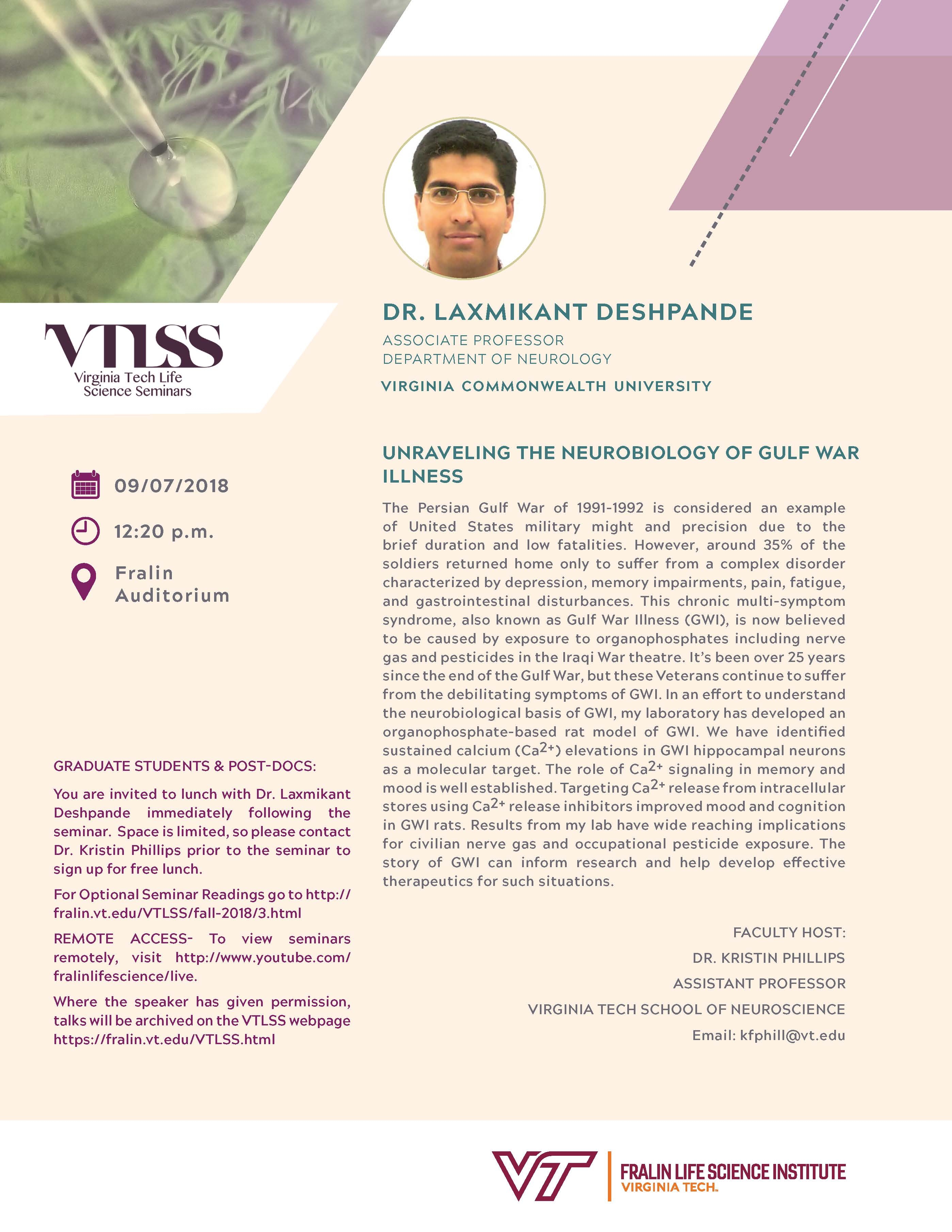Unraveling the neurobiology of Gulf War Illness

Dr. Laxmikant Deshpande
September 7 at 12:20pm in the Fralin Auditorium, Fralin Hall room 102
Hosted by Kristin Phillips
Dr. Laxmikant Deshpande is an Associate Professor in the Department of Neurology at Virginia Commonwealth University, Richmond, VA. He received his Bachelor’s and Master’s degrees in Pharmacy from Nagpur University Department of Pharmaceutical Sciences, India. He conducted his PhD studies in Pharmacology and Toxicology and his postdoctoral training in Neurology both at Virginia Commonwealth University. Dr. Deshpande’s research program focuses on developing rodent models for identifying mechanisms and therapeutics for the treatment of mortality and morbidity following exposures to organophosphate pesticides and nerve gas. His work is supported by grants from the U.S. Department of Defense and the NIH CounterACT program.
The Persian Gulf War of 1991-1992 is considered an example of United States military might and precision due to the brief duration and low fatalities. However, around 35% of the soldiers returned home only to suffer from a complex disorder characterized by depression, memory impairments, pain, fatigue, and gastrointestinal disturbances. This chronic multi-symptom syndrome, also known as Gulf War Illness (GWI), is now believed to be caused by exposure to organophosphates including nerve gas and pesticides in the Iraqi War theatre. It’s been over 25 years since the end of the Gulf War, but these Veterans continue to suffer from the debilitating symptoms of GWI. In an effort to understand the neurobiological basis of GWI, my laboratory has developed an organophosphate-based rat model of GWI. We have identified sustained calcium (Ca2+) elevations in GWI hippocampal neurons as a molecular target. The role of Ca2+ signaling in memory and mood is well established. Targeting Ca2+ release from intracellular stores using Ca2+ release inhibitors improved mood and cognition in GWI rats. Results from my lab have wide reaching implications for civilian nerve gas and occupational pesticide exposure. The story of GWI can inform research and help develop effective therapeutics for such situations.
Phillips KF and Deshpande LS (2018) Chronic Neurological Morbidities and Elevated Hippocampal Calcium Levels in a DFP-based Rat Model of Gulf War Illness. Military Medicine Mar 1, 183 (s_1): 552-555. PMID: 29635560.
Phillips KF and Deshpande LS (2016) Repeated low-dose organophosphate DFP exposure leads to the development of depression and cognitive impairment in a rat model of Gulf War Illness. Neurotoxicology, 52: 127-33. PMID: 26619911.
Gulf War and Health: Volume 10: Update of Health Effects of Serving in the Gulf War. (2016). Cory-Slechta D, Wedge R, editors. Source Washington (DC): National Academies Press (US).

This seminar will livestreamed and archived on the Fralin YouTube channel.


